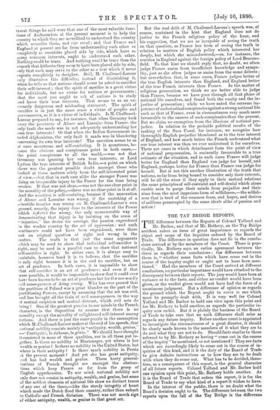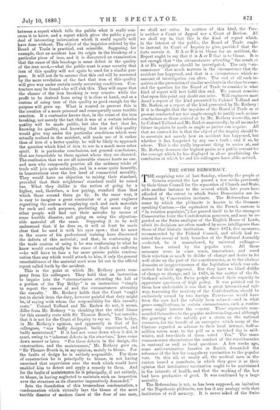THE TAY BRIDGE REPORTS.
THE difference between the Reports of Colonel Yolland and Mr. Barlow, and that of Mr. Rothery, on the Tay Bridge
accident raises an issue of great importance as regards the object and scope of the inquiries ordered by the Board of Trade. The difference in question does not lie in the conclu- sions arrived at by the members of the Court. There is prac- tically, Mr. Rothery says, an entire agreement between the three as regards their conclusions ; the difference between them is, "whether some facts which have come out in the course of the inquiry ought or ought not to have been men- tioned." Had the members of the Court arrived at different conclusions, no particular importance would have attached to the discrepancy between their reports. The jury would have been at variance as to the facts, and either no verdict would have been given, or the verdict given would not have had the force of a unanimous judgment. But a difference of opinion as regards the ground which the Report ought to cover is one which must be promptly dealt with. It is very well for Colonel Yolland and Mr. Barlow to hold one view upon this point and for Mr. Rothery to hold another, as regards the particular in- quiry now ended. But it is plainly the business of the Board of Trade to take care that no such difference shall arise as regards any future inquiry. Before another court is appointed to investigate the circumstances of a great disaster, it should be clearly made known to the members of it what they are to do and what they are not to do. Should facts similar to those referred to by Mr. Rothery as having " come out in the course of the inquiry" be mentioned, or not mentioned ? They are facts which are exceedingly likely to come out in the course of in- quiries of this kind, and it is the duty of the Board of Trade to give definite instructions as to how they are to be dealt with when they do come out. What has to be decided, there- fore, as a consequence of this report, is the general character of all future reports. Colonel Yolland and Mr. Barlow hold one opinion upon this point, Mr. Rothery holds another. As it is the Board of Trade that orders the report, it is for the Board of Trade to say what kind of a report it wishes to have.
In the interest of the public, there is no doubt what the Board's decision ought to be. The difference between the two reports upon the fall of the Tay Bridge is the difference between a report which tells the public what it really con- cerns it to know, and a report which gives the public a great deal of interesting information which it could equally well have done without. The object of the inquiries ordered by the Board of Trade is practical, not scientific. Supposing, for example, that an accident has its origin in the breaking of a particular piece of iron, and it is discovered on examination that the cause of this breakage is some defect in the quality of the iron used,—what the public want is some security that iron of this quality will not again be used for a similar pur- pose. It will not do to assume that this end will be answered by the mere revelation of the fact that iron of this quality will give way under certain rarely occurring conditions. Con- tractors may be found who will risk this. They will argue that the chance of the iron breaking is very remote, while the profit to be derived from using it is close at hand, and so a custom of using iron of this quality as good enough for the purpose will grow up. What is wanted to prevent this is the creation of a more personal and consequently more terrible sanction. If a contractor knows that, in the event of the iron breaking, not merely the fact that it was of a certain inferior quality will be made public, but also the fact that he, knowing its quality, and knowing that iron of this quality would give way under the particular conditions which were actually realised in the accident, still made use of it rather than of iron of a better quality, he will be likely to approach the question which kind of iron to use in a much more sober spirit. It is particular conclusions, not general conclusions, that are formidable to those against whom they are directed. The confession that we are all miserable sinners hurts no one, and men who composedly practise all the ordinary tricks of trade will join quite naturally, and in a sense quite honestly, in lamentations over the low level of commercial morality. They would have no objection to raising their standard, provided that their neighbours' standard could be raised too. What they dislike is the notion of going by a higher, and, therefore, a less paying, standard than that • which those around them go by. In the same way, it is easy to imagine a great contractor or a great engineer regretting the custom of employing such and such materials for such and such purposes, predicting that some day or other people will find Out their mistake by means of some terrible disaster, and going on using the objection- able material all the same. Supposing it to be well understood that, if he does so, it will at least be made clear that he used it with his eyes open ; that he must in the course of his professional training have discovered the defects of this material ; and that, in conforming to the trade custom of using it he was conforming to what he knew would eventually be the cause of death and suffering —he will have to face a far more precise public condem- nation than any which would attach to him, if only the general unsuitableness of the material used were let out in the official report called forth by the accident.
This is the point at which Mr. Rothery parts com- pany from his colleagues. They hold that an instruction to inquire into the "circumstances attending the fall of a portion of the Tay Bridge" is an instruction "simply to report the causes of and the circumstances attending the casualty." Mr. Rothery holds that the Court "ought not to shrink from the duty, however painful that duty might be, of saying with whom the responsibility for this casualty rests." Colonel Yolland and Mr. Barlow do not, it seems, differ from Mr. Rothery "in thinking that the chief blame for this casualty rests with Sir Thomas Bouch," but consider that it is not for the Court of Inquiry to say so. The budge, in Mr. Rothery's opinion, and apparently in that of his colleagues, "was badly designed, badly constructed, and badly maintained." If it had not come down when it did, it must, owing to "inherent defects in the structure," have come down sooner or later. "For these defects in the design, the construction, and the maintenance," Mr. Rothery goes on, "Sir Thomas Bouch is, in my opinion, mainly to blame. For the faults of design he is entirely responsible. For those of construction he is principally to blame, in not having exercised that supervision over the work which would have enabled him to detect and apply a remedy to them. And
for the faults of maintenance he is principally, if not entirely, to blame, in having neglected to maintain such an inspection over the structure as its character imperatively demanded." Into the foundation of this tremendous condemnation, a condemnation which virtually lays the blame of the most terrible disaster of modern times at the door of one man,
we shall not enter. In matters of this kind, the Presi is neither a Court of Appeal nor a Court of Review. All we shall say is, that this is the kind of report which. in the interest of the public, the Board of Trade ought to instruct its Court of Inquiry to give, provided that the facts sustain it. if A or B is to blame for an accident, the Report ought to say that it is A or B that is to blame. It is not enough that " the circumstances attending" the result of A or B's negligence should be investigated. The only "cir- cumstance " that much matters is the circumstance that the accident has happened, and that, is a circumstance which no amount of investigation can alter. The end of all such in- quiries is the prevention of similar accidents in the time to come, and the question for the Board of Trade to consider is what kind of report will best fulfil this end. We cannot conceive that upon this point any doubt can arise. Will engineers most dread a report of the kind presented by Colonel Yolland and Mr. Barlow, or a report of the k;nd presented by Mr. Rothery If it is thought that the inquiries of the Board of Trade as at present conducted arc not ample enough to justify such serious conclusions as those arrived at by Mr. Rothery avowedly, and by Colonel Yolland and Mr. Barlow unavowedly, by all means let future inquiries be made as ample as justice can require. All that we contend for is that the object of the inquiry should be to ascertain not merely how an accident has happened, but whether it has happened by any one's fault ; and if so, by whose. This is the really important thing to arrive at, and Mr. Rothery deserves the highest praise as a public servant for the courage which he has displayed in alone proclaiming the conclusion at which he and his colleagues have alike arrived.



































 Previous page
Previous page